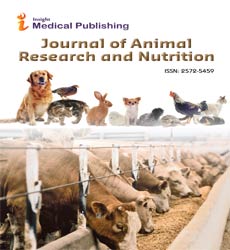The Ethical Treatment of Animals and Aspects of Animal Welfare
Edward Kile*
Department of Animal Science, Kwame Nkrumah University of Science and Technology, Kumasi, Ghana
DOI10.36648/2572-5459.9.2.117
Edward Kile*
Department of Animal Science, Kwame Nkrumah University of Science and Technology, Kumasi, Ghana
- *Corresponding Author:
- Edward Kile
Department of Animal Science, Kwame Nkrumah University of Science and Technology, Kumasi,
Ghana,
E-mail: Kile_e@gmail.com
Received date: March 08, 2024, Manuscript No. IPJARN-24-19173; Editor assigned date: March 11, 2024, PreQC No. IPJARN-24-19173 (PQ); Reviewed date: March 25, 2024, QC No. IPJARN-24-19173; Revised date: April 01, 2024, Manuscript No. IPJARN-24-19173 (R); Published date: April 08, 2024, DOI: 10.36648/2572-5459.9.2.117
Citation: Kile E (2024) The Ethical Treatment of Animals and Aspects of Animal Welfare. J Anim Res Nutr Vol.9 No.2: 117.
Description
Animal welfare is a critical aspect of contemporary ethical, environmental and scientific discourse. It encompasses the wellbeing of animals in various settings, including farms, research facilities, zoos and homes. The concept goes beyond mere survival to include the animals' physical health, mental state and natural behaviors. Ensuring high standards of animal welfare not only benefits animals but also enhances human health, environmental sustainability.
Animal welfare
The ethical treatment of animals is a fundamental aspect of animal welfare. Historically, animals have been used for various human needs, from labor and companionship to food and scientific research. However, as society progresses, there is a growing recognition of animals as sentient beings capable of experiencing pain, fear and pleasure. This shift in perspective has profound ethical implications, urging us to reconsider how we interact with and treat animals.
The concept of sentience is central to the ethical argument for animal welfare. Sentient animals can perceive and respond to their environment, experience emotions and have individual needs and preferences. Recognizing animals as sentient beings with intrinsic value challenges the traditional view of animals as mere property or resources. This ethical stance calls for significant changes in various human practices. For instance, in agriculture, the shift from intensive factory farming to more humane and sustainable practices is essential. Factory farming often subjects animals to overcrowded, stressful and unhealthy conditions, leading to severe welfare issues. By adopting more humane farming practices, such as free-range systems, organic farming and rotational grazing, we can improve the quality of life for farm animals while also producing healthier food for human consumption.
However, there is still significant variability in the strength and enforcement of animal welfare laws globally. In many regions, animals continue to suffer due to weak legislation, lack of enforcement and cultural practices that prioritize human needs over animal welfare. International cooperation and harmonization of animal welfare standards are reliable to address these disparities and promote a global culture of compassion and respect for animals. It is essential for advancing our understanding of animal biology, behavior and welfare needs, but it also raises ethical concerns regarding the use of animals in experiments. Balancing scientific progress with ethical considerations is a complex challenge that requires careful deliberation.
One of the most pressing issues in scientific research is the use of animals in experiments. Animal testing has contributed to significant advancements in medicine, toxicology and biological research. However, it often involves procedures that cause pain, distress and lasting harm to the animals involved. The ethical implications of such practices have led to a growing movement towards the development and adoption of alternatives to animal testing. These methods not only address ethical concerns but also provide more accurate and reliable data for human health and safety assessments.
Improving welfare in research settings
While the ultimate goal is to minimize or eliminate the use of animals in research, ensuring high welfare standards for animals currently used in experiments is essential. The three R’s principle-replacement, reduction and refinement provides a framework for improving animal welfare in research settings. Reduction aims to minimize the number of animals used by improving experimental design and statistical methods. Refinement focuses on enhancing the living conditions and experimental procedures to minimize pain, suffering and distress. Implementing the three R’s requires a multidisciplinary approach, involving scientists, veterinarians, ethicists and policymakers. Research institutions must establish ethics committees and welfare oversight bodies to review and monitor the use of animals in research. Training and education programs for researchers are also vital to promote awareness and adherence to welfare standards. Consumer choices have a significant impact on animal welfare. By choosing products that adhere to high welfare standards, consumers can drive demand for humane practices. Labels and certifications, such as organic, free-range and cruelty-free, provide information about the welfare standards behind products, allowing consumers to make informed decisions.
Advocacy organizations, such as the humane society and the world animal protection, work tirelessly to promote animal welfare. These organizations engage in activities ranging from public education and awareness campaigns to direct action and lobbying for legislative change. Their efforts have led to significant improvements in animal welfare standards and policies worldwide.
Animal welfare is a multifaceted issue that intersects with ethics, science, law and public policy. Ensuring the well-being of animals is not only a moral imperative but also a crucial aspect of a just and humane society. By recognizing animals as sentient beings with intrinsic value, we can transform our practices and policies to promote compassion and respect.

Open Access Journals
- Aquaculture & Veterinary Science
- Chemistry & Chemical Sciences
- Clinical Sciences
- Engineering
- General Science
- Genetics & Molecular Biology
- Health Care & Nursing
- Immunology & Microbiology
- Materials Science
- Mathematics & Physics
- Medical Sciences
- Neurology & Psychiatry
- Oncology & Cancer Science
- Pharmaceutical Sciences
